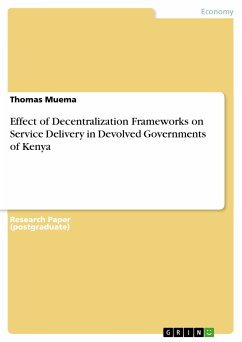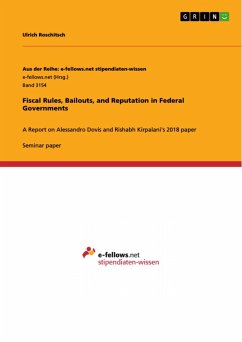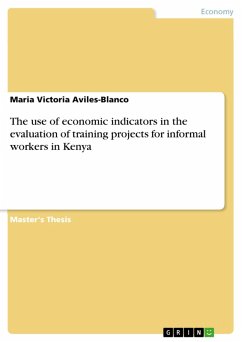Research Paper (postgraduate) from the year 2019 in the subject Economics - Monetary theory and policy, grade: B, Kenyatta University (Department of Entrepreneurship, Technology, Leadership and Management), course: Leadership and Governance, language: English, abstract: This study aims at analyzing the effect of decentralization frameworks on service delivery by devolved governments in Kenya. Devolution as a system of governance was introduced after the promulgation of the new constitution in 2010. Since then, both levels of governments have been working hard in order to implement all the new structures required for the operationalization of the new system. The statement of the problem shows that the process of implementation has faced many bottlenecks at the political, administrative and fiscal levels hence curtailing the speed of implementation and service delivery as detailed in the literature review. The research objectives have brought out the variables under the study as: to determine the effect of fiscal decentralization framework on service delivery by devolved governments in Kenya; to examine the effect of political decentralization framework on service delivery by devolved governments in Kenya; to investigate the effects of administrative decentralization framework on service delivery by devolved governments in Kenya, investigate the effects of economic decentralization framework on service delivery by devolved governments in Kenya to establish the moderating influence of regulatory frameworks on political, fiscal and administrative decentralization and service delivery in Kenya. The study will be undertaken in 14 counties covering all the main regions of Kenya. Several theories have been explored linked to the various variables considered under the study. These are: The Soufflé theory, The social capital theory, The principal Agent theory and finally the Accountability theory. The conceptual framework outlines the independent variables, as administrative, political and fiscal decentralization while the dependent variable is service delivery. The moderating variable is the regulatory framework. Data will be collected by the use of a questionnaire. The quantitative data will be captured with the help of a likert scale while the qualitative data will be captured with open- ended questions at the end of each variable. Data analysis will be done by both qualitative and quantitative methods, as both types of data will have been collected. Quantitative data will be analyzed by use of the statistical package for social sciences (SPSS).
Dieser Download kann aus rechtlichen Gründen nur mit Rechnungsadresse in A, B, BG, CY, CZ, D, DK, EW, E, FIN, F, GR, HR, H, IRL, I, LT, L, LR, M, NL, PL, P, R, S, SLO, SK ausgeliefert werden.









